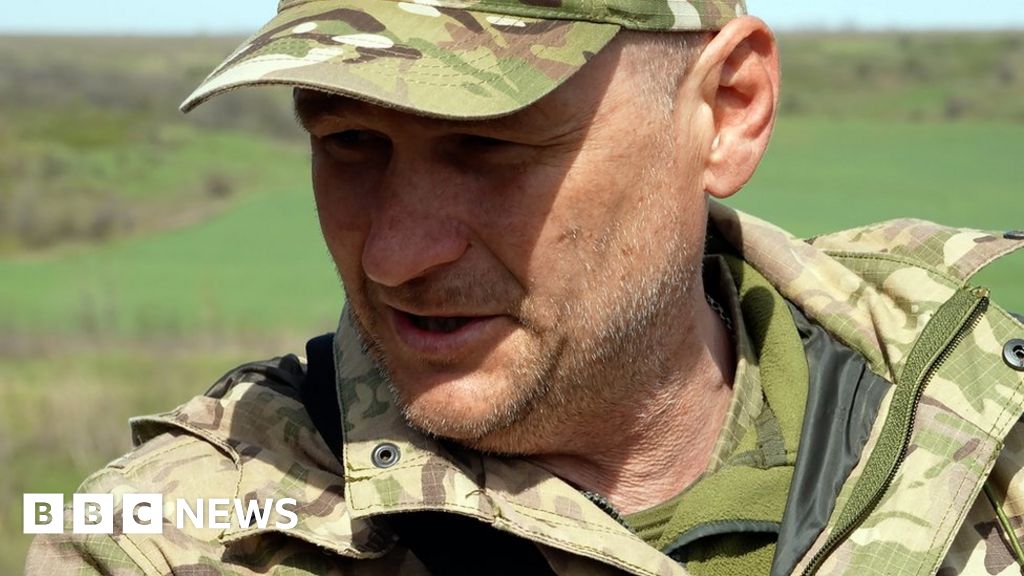
www.bbc.com
Ukraine war: Bakhmut defenders worry about losing support
Lack of ammunition is hampering Ukrainian fighters as they prepare an expected major offensive.
International
A year ago Volodymyr and his men were firing all 40 barrels of their BM-21 Grad rocket launcher in one go. Now they can only afford to fire a few at a time at Russian targets.
"We haven't got enough ammunition for our weapon," he explains.
His unit, the 17th Tank Battalion, is still being called on to provide fire support to Ukrainian forces desperately clinging on to the edges of Bakhmut, the eastern Ukrainian city which Russia has spent months trying to capture.
Russian forces are getting ever closer to their goal of taking the city, but at enormous cost.
While we're waiting in a line of trees, hidden from view, Volodymyr receives a call to fire his rocket launcher at a Russian mortar position about 15 kilometres away.
His men remove the branches camouflaging their vehicle. They drive towards an empty field about a kilometre away and quickly work out the range.
They elevate the rocket barrels towards the target while, out of sight, a Ukrainian drone hovering above assesses their accuracy.
They're told their first rocket misses by about 50 metres, so they adjust the elevation and fire another two and quickly return to the trees for cover. This time they're told they've hit the target.
Volodymyr however, is frustrated they can't do more. "We could have provided more support to our guys who are dying there."
He says Ukraine has already burned through its own stocks of Grad ammunition, so is relying on rockets sourced from other countries. Volodymyr says supplies are coming from the Czech Republic, Romania and Pakistan. He complains the rockets originating from Pakistan are "not of a good quality".
Ukraine's call for more weapons and ammunition has only become louder the longer the war has gone on. The focus now is preparing for a major offensive. But at the same time Ukraine is still having to expend huge resources on just maintaining its position.
Despite the recent arrival of modern weapons - like tanks and armoured vehicles - Ukraine remains heavily reliant on its older, Soviet-era arsenal.
The Russian-made Buk air defence system, which can target aircraft, drones and missiles, is still one of its prized possessions. We get rare access to see one further along the front line - also hidden in a wooded area.
This sophisticated weaponry has helped prevent Russia gaining control of the skies.
Josef, the Buk commander, tells me it's "target number one for Russia". This explains the extreme care taken to protect it. The long vehicle with its radar dome is buried in a deep trench covered with camouflage netting. On top are two grey missiles. Normally it carries four.
A cache of classified US documents was leaked online earlier this month - maps, charts and photos - revealing detailed intelligence gathered on the war.
I ask Josef if these were correct in highlighting an acute shortage of Buk missiles. "No, that's not true," he insists. But he does admit that the Buk is proving hard to maintain and Ukraine needs more.
"We haven't got enough," he says. "Parts break and we haven't got spares because the factories that produce them are not in Ukraine."
Josef doesn't only dispute some of the contents of those leaked US intelligence reports. He questions whether they have really revealed any secrets.
"Why should we be angry with the Americans?" he asks. "Because they gave information the Russians have had for 20 years? Ridiculous!" Russia, he believes, has always known about the capabilities of Ukraine's armed forces.
But Russia still does not know the timing or place of Ukraine's expected offensive. It will be key to taking back territory and relieving some of the pressure being felt along Ukraine's 800 mile (1,300km) front. Wherever it happens Russia will have to redirect some of its forces.
But Ukraine too is having to arm and equip new units to conduct that offensive. Both sides are struggling to feed the front line.
At another location near Bakhmut, Ukrainian troops from its 80th Brigade are already expending hundreds of artillery rounds a day, to try to repel Russia's advances.
They are already using some of the weapons supplied by the West. Serhiy and his men are operating a British made L119 light artillery gun. But Serhiy says they too are having to ration rounds. He says they're firing on average 30 rounds a day.
"We've got enough people for the moment", he says. "But we need ammunition. Ammunition is the most important."
I ask Serhiy if this is the make or break year for Ukraine. "If we go on the offensive this year and retake our land, then we'll win," he replies. "But, if that doesn't happen, then we don't have the resources for the war to go on for another five to ten years."
Volodymyr, the commander of the Grad, is even more blunt. "The country is exhausted, the economy too," he says.
And he fears that if Ukraine's action on the battlefield are not decisive this year then Western support may falter. "We are also worried our Western allies are getting tired of helping us."
























































